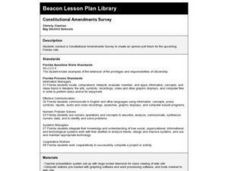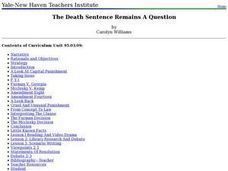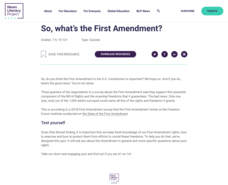University of Arkansas
Promises Denied
"Promises Denied," the second instructional activity in a unit that asks learners to consider the responsibilities individuals have to uphold human rights, looks at documents that illustrate the difficulty the US has had trying to live...
Scholastic
The Right to Vote
Who used to have the right to vote in the United States? Who has the right to vote now? Amendments to the US Constitution that have changed the definition of eligible voters are the focus of a one-page worksheet that asks class members...
Judicial Learning Center
Civil Rights and Equal Protection
Almost every American is familiar with the Supreme Court case of Brown vs. Board of Education. Far fewer understand the constitutional reasoning or the wide-ranging consequences of the ruling in the field of criminology. The interesting...
Judicial Learning Center
Law and the Rule of Law
We hear a lot about the importance of the rule of law, but most people do not really know what those words mean. The lesson is a webpage that defines the rule of law, explains why it is important in a democratic society and provides...
School Improvement in Maryland
Dividing the Powers of Government
Who does what? To develop an understanding of the balance of power between the US federal and state governments, class members research responsibilities in terms of legal systems, security issues, economic activities, lawmaking, and...
Bismarck Public Schools
Executive Branch Worksheet
Consider using this assessment on the executive branch of the United States Constitution to help you work backward and plan your curriculum accordingly. The worksheet covers who specifically holds the office of chief executive,...
Curated OER
US Government: The Checks and Balances System of the US Constitution
Students examine the responsibilities of the 3 branches of U.S. government. In this checks and balances lesson, students identify the powers of the legislative, executive, and judicial branches of government. Students share examples of...
Curated OER
US Constitution And Amendments
Students become familiar with the US Constitution and consider how it affects their lives. They research the Preamble to articulate the purposes of government, compile collages, and research the separation of powers within each branch of...
Curated OER
Abraham Lincoln and the U.S. Constitution
Learners investigate President Abraham Lincoln's use of the U.S. Constitution and its importance to the Civil War. For this US history lesson, students read text about President Lincoln and the US Constitution. Learners examine the...
Curated OER
The Inauguration and the Constitution
Students read the sections of the US Constitution that discuss the elements of the inauguration. They study how the inauguration symbolizes the peaceful transition of power in a democratic republic and show the parts of the inauguration...
Curated OER
What Makes Us Free?: Maine's Declaration of Rights
Young scholars analyze Maine's Declaration of Rights. They review state constitutions and declaration of rights and their importance. They analyze a section of Maine's Declaration of Rights and crete their own declarations of rights....
Curated OER
Conflicting Ideas about the Completed Constitution
Students analyze and discuss the opinions about the US Constitution as given by Benjamin Franklin and George Mason.
Curated OER
Paving the Road to the Constitution
Eighth graders assess the strengths and weaknessess of the Articles of Confederation as related to the United States and North Carolina. They demonstrate an argument for or against ratification of the United States Constitution.
Curated OER
Constitutional Amendments Survey
Young scholars conduct Constitutional Amendments Survey to create an opinion poll forum.
Benjamin Franklin Tercentenary
Benjamin Franklin, Elder Statesman
Ben Franklin was the only American to sign The Declaration of Independence, the Treaty of Alliance with France, the Treaty of Paris, and the US Constitution. An interesting resource explores his role in the latter by comparing the US...
Curated OER
The Death Sentence Remains A Question
Examine the results of recent opinion polls on where people stand on the issue of the death penalty. In groups, middle schoolers examine various cases dealing with this issue and discuss the judgments. They write their own argument for...
Curated OER
Lesson 4: The Judiciary: A Brief Introduction to the Courts System
Focusing on the judicial branch of government, the fourth instructional activity in this series explores the structure of the US courts system. Beginning with an engaging activity based on the short story The Lady or the Tiger,...
Advocates for Human Rights
Human Rights Defined
Class members continue their investigation of the factors that influence migration with a lesson on human rights. As they examine the Universal Declaration of Human Rights and selected US Constitutional Amendments, learners compare the...
Constitutional Rights Foundation
Slavery and the Electoral College
How did slavery mold the creation of the US Constitution? The final lesson in the series focuses on how slavery impacted the creation of the Electoral College. Academics learn how the Electoral College was created because Southern states...
Curated OER
Proposition 8 Struck Down
Have your class examine the issues surrounding same-sex marriage, civil rights, and proposition 8. They read a New York Times article entitled "Proposition 8 Struck Down" and then answer 10 who, what, when, where, and why questions....
Carolina K-12
Marsh v. Chambers and the Establishment Clause
1983 Supreme Court case Marsh v. Chambers, which centers on whether opening a legislative session with a prayer violates the Establishment Clause in the First Amendment to the US Constitution, is the focus of a series of discussions and...
Judicial Learning Center
Judicial Independence: What’s Wrong with This Court?
Why is it important for judges to operate independently of politics or other branches of government? Scholars ponder the question as they examine video clips, case studies, excerpts of the US Constitution, and an interactive computer...
News Literacy Project
So, What’s the First Amendment?
The First Amendment to the US Constitution protects people's rights to speech, the press, and religion. Using the resource, scholars discover how. They take a brief online quiz to determine how well they understand the First...
Center for Civic Education
Lesson 2: Suffrage Amendments
Youngsters examine selected amendments to the Constitution to determine how voting requirements in the US have changed from the colonial days to the present.
Other popular searches
- Us Constitution
- Us Constitution Amendments
- The Us Constitution
- Us Constitution Day
- Us Constitution Word Puzzles
- Us Constitution Lessons
- Amending the Us Constitution
- Us Constitution Test
- Us Constitution Projects
- Us Constitution Activity
- Forming the Us Constitution
- Us Constitution Article 1

























